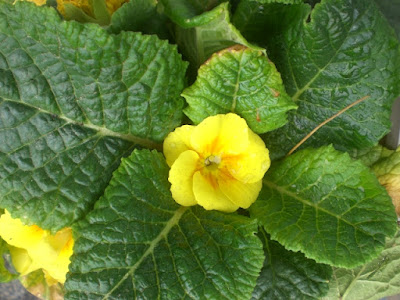After a much-too-snowy winter (like the night of a record two-foot snowfall!), my husband was eager to welcome spring by planting some primroses by our front walk. Their name comes from the Latin prim for “first” (as in first of spring), and their compact growing pattern and bright colors always cheer. Sometimes they make me think of the phrase “Primrose Path,” which I long associated with some ultra-lovely garden. Maybe that's because our English word “prim” (for a very proper and demure person) comes from that word in French. Still, I'd envision lovely gardens with all the rainbow's colors, artfully planted, and probably primroses lining a flagstone walkway. Perhaps there's such a garden somewhere, but not in our hot climate. Primroses grow best in damp, wooded-like conditions. If that sends your imagination to fairies, you probably recall this 1916 children's song:
White coral bells upon a slender stock. Lilies of the valley deck my garden walk. Oh, don't you wish that you could hear them ring, That will happen only when the fairies sing.
Sorry, but primroses didn't make it into these song lyrics, as least from what I researched. Instead, they have a darker reputation tracing back to Shakespeare's plays. In Hamlet, Ophelia's brother Laertes is lecturing her how to behave while he's away at a university in Paris. She turns his advice around, warning him to behave himself since fellow students have quite a negative moral reputation. Her warning (in that quaint Old English):
Show me the steep and stormy way to heaven whiles like a puffed and reckless libertine himself the primrose path of dalliance treads and recks not his own rede. (Hamlet, 1.3).
Shakespeare's audiences understood Ophelia's worry that such behavioral paths led to bad outcomes. Because this was the era of the King James Bible, no doubt audiences also knew the Bible's warning about the moral gate that led to destruction (Matthew 7:13). Over centuries, that allusion led to to the contemporary meaning of “Primrose Path” as “a life of pleasure and leisure that results in a negative or detrimental outcome.” (1) In other words, it's the easy way out but it has its hidden costs.
I pick up the same theme throughout the book of Proverbs. Maybe King Solomon was writing out of his disastrous experiences with the world's biggest pagan harem when he penned advice that warned against following paths that led away from God. The most vivid example is in chapter 7, where a guy is dawdling along a street when a brazen immoral woman lures him into her home. Verse 22 is chilling: “All at once he followed her...little knowing it will cost him his life.”
I once heard it said that when someone is faced with temptation, he or she should imagine Jesus watching from a nearby corner. Would He be pleased or grieved by your choice? Writing to believers in the immoral city of Corinth, Paul had similar advice:
If you think you are standing firm, be careful that you don't fall. (1 Corinthians 10:12)
He added that temptations are out there. They're a common thing in our human existence. But in keeping God in such situations, “when you are tempted, He will also provide a way out so that you can stand up under it” (1 Corinthians 10:13). To borrow a modern phrase, He will help us just say NO!
In contrast to the “Primrose Path” (in its historical meaning of pleasure leading to harm) is “the path of the righteous [which] is like the first gleam of dawn, shining ever brighter till the full light of day” (Proverbs 4:18).
I have to be honest: all this historical background saddened me! I enjoy our garden primroses. But checking out a garden-variety allusion reminded me of the higher calling to submit to the Lord's spiritual landscaping plan for my life.

No comments:
Post a Comment